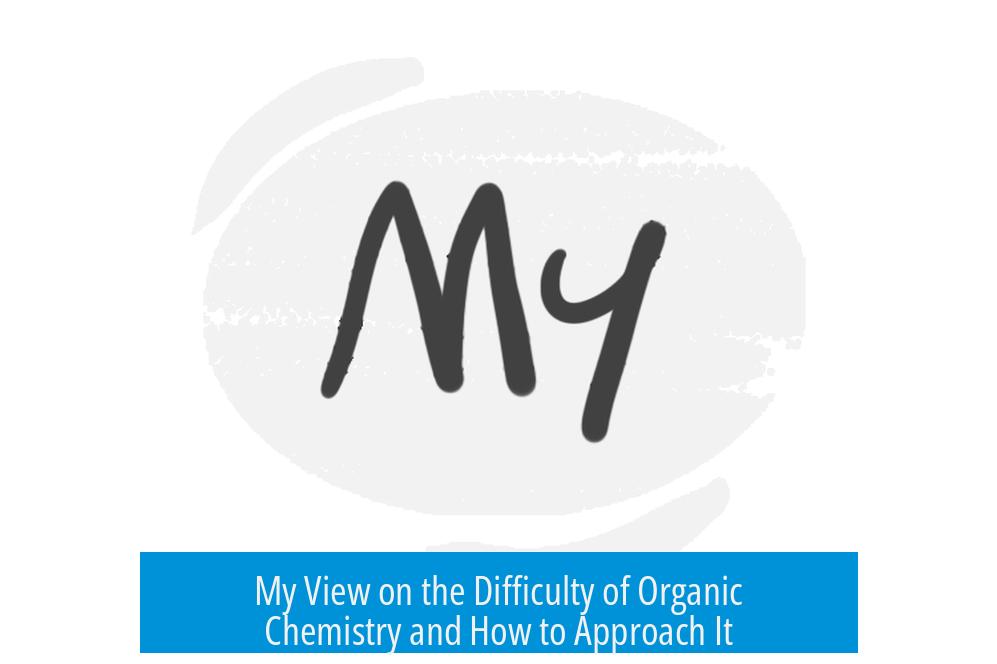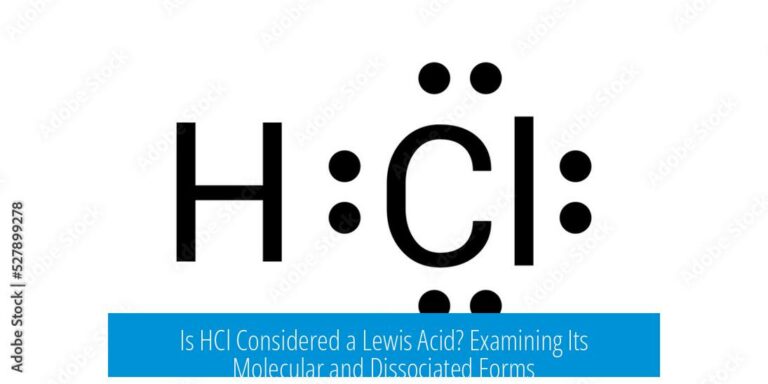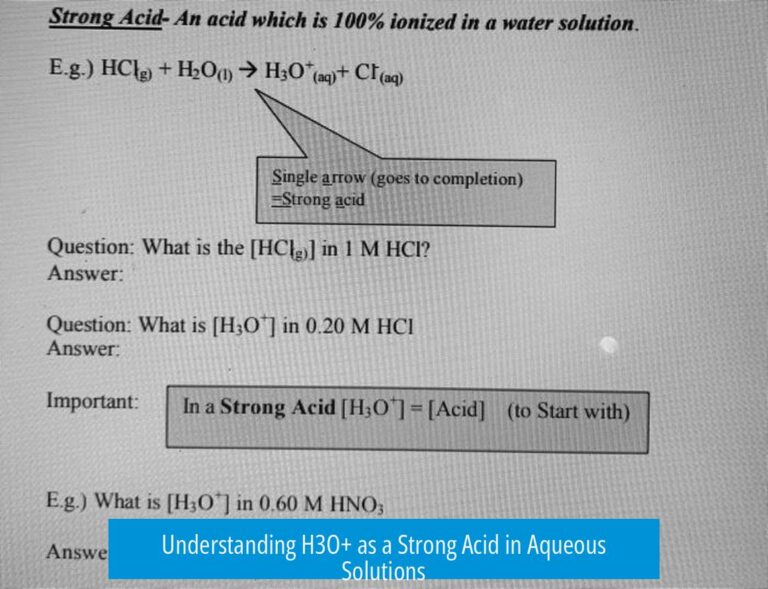My Opinion on the Difficulty of Organic Chemistry

Organic chemistry is often perceived as difficult, but much of this reputation stems from factors beyond the inherent nature of the subject. Its challenge arises mainly due to the diversity of students taking the course, the teaching methods employed, and the way learners approach the material.
Influence of Non-Chemistry Majors

A significant cause for the course’s difficulty reputation is that many non-chemistry majors are required or opt to take organic chemistry.
- Students from nursing, biology, or other sciences often face organic chemistry as one of their first rigorous upper-level courses.
- Many non-majors may lack intrinsic motivation to deeply understand mechanisms, attempting memorization instead.
- This approach leads to struggle and reinforces the idea that the subject is overly hard.
Thus, the course is less about the inherent difficulty and more about the students’ preparations and attitudes.
Understanding Mechanisms vs. Memorization

Successful learners focus on the logic behind reactions rather than rote memorization.
- Organic reactions involve electron flow: electrons move from areas of high density (nucleophiles) to low density (electrophiles).
- Breaking weak bonds and forming strong bonds underlies reaction steps.
- Grasping this electron flow enables students to predict outcomes rather than recall isolated facts.
Most struggling students attempt to memorize individual reactions, leading to confusion and poor exam performance. Teaching often fails by emphasizing memorization over conceptual understanding.
Changing the Way of Thinking

Organic chemistry demands a new mindset, different from earlier science courses.
- It is less about facts and more about applying concepts to novel problems.
- The course is time-intensive due to the volume and complexity of material.
- Instructors who focus on patterns and mechanisms help students think more effectively.
- Courses depending heavily on memorization hinder true comprehension.
Students who learn organic chemistry as pattern recognition, akin to learning a language, often fare better.
Comparison to Physical Chemistry
Within chemistry, organic chemistry is generally viewed as less conceptually abstract than physical chemistry.
- Physical chemistry involves quantum mechanics, thermodynamics, and complex equations.
- Many chemists find physical chemistry conceptually tough but logically satisfying.
- Organic chemistry resembles solving chemical puzzles using electron flow logic.
Thus, organic chemistry is difficult mainly because it challenges students to think differently, not because it is inherently more complex.
Role of Teaching Quality and Curriculum
Teaching quality dramatically influences perceptions of organic chemistry’s difficulty.
- Many professors rely on memorization-heavy curricula, discouraging deep understanding.
- A good instructor emphasizes conceptual understanding and explains the “why” behind reactions.
- Students reporting organic chemistry as very difficult often encounter poor teaching methods.
Variations in pedagogy impact how approachable the course feels.
Pattern Recognition and Intuition
Students with strong pattern recognition abilities tend to find organic chemistry easier.
- Recognizing recurring mechanisms and electron flow patterns aids learning.
- Viewing organic chemistry as a “foreign language” can help internalize structures and reactions.
- Not all students possess this intuition naturally, which can make the course feel more difficult.
Memorization Still Required
While understanding mechanisms is crucial, memorization remains a component.
- Students must recall reagent types, reaction conditions, and specific pKa values.
- Combining memorization with conceptual insight demands effort and study time.
- Time pressure during exams compounds difficulty in recalling and applying knowledge.
Exams and Time Pressure
Examination format also contributes to organic chemistry’s difficulty.
- Exams typically cover extensive material over limited time.
- Rapidly interpreting spectroscopic data, deducing mechanisms, and solving synthesis problems is challenging.
- These factors intensify stress and may impair recall.
Developmental and Educational Context
Perceptions of difficulty vary by educational background and country.
- Some countries introduce basic organic concepts earlier in education, easing college-level difficulty.
- Advanced organic chemistry concepts remain challenging outside specialized study, especially for younger learners.
Overall Summary of Perspectives
The difficulty of organic chemistry depends on several interconnected factors:
| Factor | Impact on Difficulty |
|---|---|
| Student Background | Non-chemistry majors often find the course harder due to weaker foundational knowledge or motivation. |
| Approach to Learning | Memorization-heavy approaches cause struggles; understanding mechanisms improves success. |
| Teaching Quality | Effective educators enhance comprehension; poor teaching emphasizes cumbersome memorization. |
| Exam Format | Time-limited exams covering vast topics increase perceived difficulty. |
| Intellectual Skills | Pattern recognition and logical thinking aid mastery. |
Key Takeaways
- Organic chemistry’s difficulty is often exaggerated and linked to teaching and learning methods.
- Understanding electron flow and reaction mechanisms is critical for success.
- Memorization is necessary but insufficient alone.
- Motivation and background knowledge strongly influence a student’s experience.
- Effective instructors make the course more accessible by focusing on concepts over rote learning.
My Opinion on the “Difficulty” of Organic Chemistry: Why It’s Not as Tough as You Think
Is organic chemistry truly difficult? My answer is a resounding “No”—but it comes with a twist. It’s not that the subject itself bristles with insurmountable complexity; instead, the perceived difficulty is mostly about how it’s presented and who takes it. I’ve seen students stress, sweat, and fret over organic chem. Yet, those who grasp the core principles find it incredibly logical and even enjoyable. So, what’s really going on here?
Let’s unpack this organic chemistry enigma from multiple angles—debunk myths, highlight real challenges, and toss in some solid advice for survival.
Why Does Organic Chemistry Have a Bad Rap?
First, my take: Organic chemistry’s bad reputation isn’t because it’s inherently hard. It’s because, quite simply, a LOT of non-chemistry majors must take it. Imagine walking into a class supposed to stretch your brain in ways you’ve never encountered before—while you’re trying to juggle study plans for nursing, biology, or pharmacology majors. No warm-up, no intro classes that ease you into high-level science concepts—just a straight dive into molecular juggling. That’s a lot of students facing organic chem as their first big challenge beyond general chemistry.
Many students approach organic chemistry as a memorization marathon. They believe if they cram enough facts, reactions, and mechanisms into their brains, victory will follow. Spoiler alert: it rarely does. Instead of memorizing like a parrot, organic chemistry asks you to think like a detective.
Understanding, Not Memorization, Is the True Secret
This is key—organic chemistry is mostly about understanding the flow of electrons. When I tutor, I try to show students that chemistry isn’t just random facts but a story about how electrons move. Picture electrons as little adventurers: they seek out spots of low electron density, attack those locations, break weak bonds, and form stronger ones. It’s a dance of positives attracting negatives, a constant flow of molecular give and take. When you get that, suddenly it all clicks.
Most students who flunk try to memorize each reaction by its name or memorize every reagent like it’s sacred scripture, without grasping the “why” behind the reaction. Organic chemistry textbooks and some professors exacerbate this by focusing too much on rote learning rather than explaining mechanisms. It’s less about data dumping and more akin to learning a language—one where symbols and arrows tell a story.
Thinking Differently: The Unique Learning Approach Organic Chemistry Demands
Here’s the elephant in the lab: organic chemistry requires a different kind of thinking. You can’t just rely on memorizing tables or repeating formulas.
It’s not just harder; it’s fundamentally different in logic. Rather than pure recall, organic chemistry demands pattern recognition and problem-solving. Professors often don’t realize that the teaching style matters enormously. Some break concepts into bite-sized chunks, others throw too much info too fast, making the course feel overwhelming.
Imagine trying to assemble a complex puzzle when half the pieces look similar and you’ve never seen the final picture. You need patience and practice—organic chemistry is time-consuming, not rocket-science difficult. The students I’ve seen do well are those who consistently practiced recognizing patterns and electron flow rather than memorizing isolated facts.
Organic Chemistry Compared to Physical Chemistry: The Real Brain-Buster?
Among chemists, organic chemistry is often granted an unfair reputation. Many agree that physical chemistry is the real mental heavyweight. That’s where you tackle quantum mechanics, thermodynamics, and statistical mechanics—subjects that truly bend the mind.
Physical chemistry makes sense once you understand the equations and fundamentals, but it’s not everyone’s cup of tea. Organic chemistry is more like solving molecular puzzles. If you enjoy recognizing patterns, you’ll find organic chemistry rewarding rather than intimidating.
Does this mean organic chemistry is “easy”? Not exactly. It’s just more approachable for those who like visualizing molecules and electron movements. Physical chemistry, in comparison, can feel abstract and mathematically dense.
The Impact of Teaching Quality and Curriculum
Here’s a harsh truth: over 85% of the difficulty in organic chemistry lies in how it’s taught. I’ve taken courses from six different professors, and the variance was astounding. Some instructors made the material come alive, emphasizing underlying principles and mechanistic thinking. Others almost encouraged memorization, making students drown in reactions without context.
Much of the standard curriculum still focuses heavily on memorization. This is counterproductive and intimidates students unnecessarily. A good professor can transform organic chemistry from a nightmare into a manageable, even enjoyable, subject. In contrast, poor teaching perpetuates the fear and frustration associated with it.
Pattern Recognition Matters: Is It a Talent or a Skill?
If you’re good at spotting patterns and have a bit of chemical intuition, organic chemistry will feel smoother. I wasn’t the star organic chemist, initially struggling so much that I retook the course twice before earning a B. Interestingly, when I learned Chinese—a language totally unrelated—I started seeing organic chemistry more like a foreign language, full of syntax and grammar (read: mechanisms and reagents).
This shift in perspective helped me push electrons like a language learner conjugates verbs—methodically, with understanding. So, if you think of organic chemistry as a unique language, your struggles might turn into breakthroughs.
Memorization Still Plays a Role, But It’s Not the Whole Story
Let’s be honest: organic chemistry requires memory work. You’ll need to remember conditions, reagents, exceptions, and yes, pKa values too. But relying on memory alone is a losing game. The best students balance memorization with deep understanding. You memorize enough to recognize patterns but lean heavily on understanding why reactions happen.
Many students face the crazy paradox of having to combine memorization + mechanism comprehension + working under time pressure during exams. The blend can be overwhelming, especially when organic chemistry is a student’s first real upper-level challenge.
The Exam Pressure Cooker: Why Time Makes It Harder
Anyone who’s sat through an organic chemistry exam knows the pressure is intense: a month and a half of content compressed into a couple of hours. You must recall mechanisms, memorize reagents, analyze NMR spectra, piece together molecular structures, and solve synthesis problems—all without the luxury of unlimited time.
Time pressure combined with dense material challenges even the best-prepared minds. It’s not always a measure of intelligence, but speed, familiarity with content, and test strategy. This is why some students bomb quizzes despite knowing the material.`,
Developmental and Educational Context Matters
Perceptions of difficulty aren’t universal. In the UK, where students start learning basic organic chemistry as early as 14, the subject is generally seen as easier. Contrast that with systems where organic chemistry is introduced abruptly at college level—it’s no wonder students struggle without prior exposure.
Don’t let anyone tell you that an 11-year-old can master organic chemistry. Basic concepts? Sure. Advanced reactions and mechanisms? Not realistic or necessary for most. Education systems, cultural exposure, and teaching styles influence how students perceive and handle this subject.
Final Thoughts: The Real Verdict on Organic Chemistry’s Difficulty
It’s time to lay the myth to rest: organic chemistry is not an insurmountable monster lurking in college hallways waiting to snap at unsuspecting students. It’s a subject that rewards effort, time, and the right mindset. It requires:
- Learning a new way of thinking about molecules and reactions
- Balancing memorization and understanding mechanisms
- Withstanding time pressure during exams
- Dealing with variability in teaching quality
If you’re gearing up for organic chemistry or struggling through it, remember: You’re not alone. It’s a challenge, not a brick wall. Focus on mechanisms, seek professors who explain the “why,” develop your pattern recognition skills, and yes, put in the hours. That’s the magic recipe.
So, is organic chemistry difficult? Only if your study method, instructor, or exposure hasn’t set you up for success. With the right approach, organic chemistry becomes less of a chore and more of an intriguing puzzle. After all, chemistry is the study of change—and your mindset is the first change to master.
Practical Tips for Tackling Organic Chemistry
- Understand Electron Flow: Stop memorizing whole reactions. Learn how electrons move—it’s the core principle behind every mechanism.
- Treat It Like a Language: Learn the “syntax” of organic chemistry. Recognize patterns and practice frequently.
- Choose Professors Wisely: If possible, pick courses taught by instructors who emphasize conceptual understanding, not rote memorization.
- Use Visual Aids: Draw mechanisms, arrow movements, and reaction steps repeatedly. Visualization helps comprehension.
- Practice Under Timed Conditions: Simulate exam scenarios to improve speed and efficiency.
- Don’t Fear Physical Chemistry: It’s tougher but more logical if you love math. Organic chemistry will feel easier in comparison.
Now go forth, future organic chemists! Embrace the electron dance and maybe even enjoy the process.
Why do many students find organic chemistry hard when they are not chemistry majors?
Non-chemistry majors often take organic chemistry early and may rely on memorization. They might not engage with the reasons behind reactions, which makes the material harder to grasp. This approach can lead to struggles and a bad reputation for the course.
How important is understanding reaction mechanisms compared to memorizing facts in organic chemistry?
Understanding mechanisms is crucial. The subject revolves around electron flow and bond changes. Memorizing without knowing why reactions occur usually causes difficulties. Grasping the concepts helps make organic chemistry manageable.
Does the way organic chemistry is taught affect its perceived difficulty?
Yes. Many professors focus on memorization instead of explaining the logic behind reactions. A well-structured class emphasizing understanding over rote learning eases the challenge. Teaching quality varies and impacts student success greatly.
How does organic chemistry compare with physical chemistry in terms of difficulty?
Most find physical chemistry more challenging. Organic chemistry relies on pattern recognition and intuition, while physical chemistry demands understanding complex equations and concepts. Physical chemistry can be harder to wrap your mind around.
Is memorization completely avoidable in organic chemistry?
No. Some memorization is necessary, such as reagents and conditions. However, combining memorization with mechanism understanding is key. Pure memorization without comprehension tends to make the class harder and less rewarding.





Leave a Comment